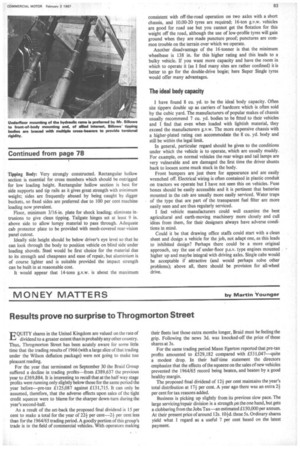Results prove no surprise to Throgmorton Street
Page 85

If you've noticed an error in this article please click here to report it so we can fix it.
EQLTITY shares in the United Kingdom are valued on the rate of dividend to a greater extent than in probably any other country. Thus, Throgmorton Street has been acutely aware for some little time that the trading results of 1966 (with a large slice of that trading under the Wilson deflation package) were not going to make too pleasant reading.
For the year that terminated on September 30 the Braid Group suffered a decline in trading profits—from £389,637 the previous year to £369,884. It is interesting to recall that at the half-way stage profits were running only slightly below those for the same period the year before—pre-tax £125,087 against £131,715. It can only be assumed, therefore, that the adverse effects upon sales of the tight credit squeeze were to blame for the sharper down-turn during the year's second-half.
As a result of the set-back the proposed final dividend is 15 per cent to make a total for the year of 22+ per cent-21 per cent less than for the 1964/65 trading period. A goodly portion of this group's trade is in the field of commercial vehicles. With operators making their fleets last those extra months longer, Braid must be feeling the grip. Following the news 3d. was knocked-off the price of these shares at 3s.
For the same trading period Mann Egerton reported that pre-tax profits amounted to £529,182 compared with £531,047—quite a modest drop. In their half-time statement the directors emphasize that the effects of the squeeze on the sales of new vehicles prevented the 1964/65 record being beaten, and beaten by a good healthy margin.
The proposed final dividend of 121 per cent maintains the year's total distribution at 171 per cent. A year ago there was an extra 21 per cent for tax reasons added.
Business is picking up slightly from its previous slow pace. The large servicing/repair division is a strength on the one hand, but gets a clobbering from the Jobs Tax—an estimated £150,000 per annum. At their present price of around 12s. 101d. these 5s. Ordinary shares yield what I regard as a useful 7 per cent based on the latest payment.
















































































































































































